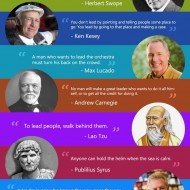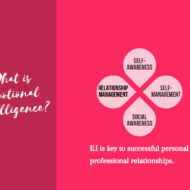Posted by Managementguru in Entrepreneurship, Human Resource
on May 14th, 2015 | 0 comments

An Insight on Traits of Successful People 1. They have a definite aim in life. “It is our choices that show what we truly are, far more than our abilities.” -J. K Rowling (from “Harry Potter and the Chamber of Secrets”) They want to accomplish something. They have #enthusiasm, commitment, and pride. They have self-discipline. They’re willing to work hard and to go the extra mile. They have a burning desire to succeed. They’re willing to do whatever it takes to get the job done. Dhirubhai Ambani was one such persona who went the extra mile to establish his empire called Reliance Industries. He believed in largest, biggest, fastest etc. Reliance textile at its introduction had production capacity greater than all of india’s need. Reliance refinery is still world’s largest refinery complex. 2. They are self-confident. “As long as the mind can envision the fact that you can do something, you can do it, as long as you really believe 100 percent.” -Arnold Schwarzenegger To be capable of setting ambitious goals, you need to believe you can follow the plans to achieve them. And when you believe in yourself, others tend to believe in you as well. In Gandhi’s words, a person can make progress and achieve success only with self-confidence. This applies to a person as well as to a nation, Gandhi said. 3. They show #initiative. “Find out who you are and be that person. That’s what your soul was put on this Earth to be. Find that truth, live that truth and everything else will come.” -Ellen DeGeneres The only way to rise up the corporate hierarchy or to develop your own business is to to look for other things to accomplish once you’ve fulfilled your regular duties. You need to outperform the already set standards and create new benchmarks for others to follow. 4. They are imaginative. “What the mind of man can conceive and believe, it can achieve.” -Napoleon Hill A lack of the driving force of initiative and the creative power of imagination is “the main reason why 95% of the adult people of the world have no definite aim in life, which, in turn, is also the reason why this same 95% constitute the followers in life”. What is lost in imagining about great things – it might only lead you to constructive creativity. 5. They are active. “Do one thing every day that scares you.” -Eleanor Roosevelt You may have earned multiple degrees from elite universities and have read history’s most important books, but none of it means anything if you don’t turn knowledge into action. This is what they call in Tamil, ஏட்டு சுரைக்காய் கறிக்குதவாது meaning Simple theoretical knowledge alone will not help in real life practical situations. 6. They are enthusiastic. “Nothing great was ever achieved without enthusiasm.” -Ralph Waldo Emerson They’re excited by what they’re doing, and that excitement is contagious. They draw people to them because these people want to work with them, do business with them, and be with them. Enthusiasm is probably one of the most attractive qualities a person can have. It’s a quality that makes you attractive in all kinds of relationship – personal or professional – and it’s a wonderful quality to find in other people. 7. They go beyond what’s required of them. “It takes 20 years to build a reputation and five minutes to ruin it. If you think about that, you’ll do things differently.” -Warren Buffett The most successful people outperform their competition, and when they make it to the top, they compete with themselves. ‘I want more’ will be their mantra. 8. They know how to separate truth from bias. “I’ve learned that people...

Posted by Managementguru in Decision Making, Entrepreneurship, Human Resource, Leadership
on Apr 21st, 2015 | 0 comments

Top Ten Tips for First Time Managers Everybody wants to become a leader. You may vie for it, I might die for it; but in reality not everybody can make a good leader. Leadership does seek persons who are unique in their own way. One unique element which I’ve noticed in managers or leaders is that when they enter the work place, they bring along with them a kind of aura that has the power to make others submissive and polite. Not to say they are over-powering but definitely the sub-ordinates would love to greet their heads with such vigor so as to be in their good books combined with a sense of loyalty laced with respect. This session talks about “First Time Managers” who have reached the position by chance or choice and the etiquettes needed to be bestowed upon that position. 1. Learning is Eternal: “கற்றது கைமண் அளவு, கல்லாதது உலகளவு –This quote by the famous Tamil lady poet Avvaiyar who lived in 13th century reminds you “What you have learned is a mere handful; what you haven’t learned is the size of the world” and exhibited at NASA. It can also be written as “Known is a drop, unknown is an Ocean.” See how appropriate she is in indicating the finer points in our lives- just because you are a team leader or a manager does not mean that you are near perfect. You may be lacking the self-confidence to lead a team or you might be falling short in communicating clearly with the team down the line. It is always better to play along with the team, understand their psychology and at the same time exercise your rights at the right spots. You will stand to gain so much by being flexible and empathetic. 2. Communication is the Key: Here I want to take the help of the ManagementGuru Peter Drucker who prescribed the medicine for better management which is “Management by Objectives.” Keep your team fully informed of project goals, priorities, and all-important deadlines and also involve them to set short term goals. A periodical review of the goals and results would put them in place and make your work easy. Effective communication makes you trust worthy in the eyes of your team, also provides clear direction and a sense of belongingness. 3. Inspire your Team: Passion is one element that is infectious and the other being smile. If you are passionate and sincere in your work, the enthusiasm flows like honey on ice-cream all over the workplace. A good manager creates that “Feel-Good-Factor’ whenever he is around. It is his confidence, emotional stability, communication and determination that gets carried on facilitating effective accomplishment of the enterprise goals. An infographic from AN ETHICAL ISLAND– A great guide for leaders and managers… 4. Be a Friend: Efficient managers understand the pulse of work-force just from their body language and communicating styles. It becomes difficult sometimes to read between the lines when employees are hard nuts to crack and would not explicitly convey or talk about important issues that are bothering them. This may be due to fear, anxiety or peer pressure. These are the times when a manager has to behave like a friend in listening to them patiently to understand the crux of the problem so as to find a suitable solution. 5. Spontaneous appreciation and Mild Criticism: Think about the happiness you derive when somebody appreciates you for a good effort or achievement. The same applies to your team also, right! Appreciation for the sake of appreciating will fetch you only negative results, it has to be spontaneous. Even a mild nod of approval, a...

Posted by Managementguru in Business Management, Change management, Human Resource, Organisational behaviour
on Jul 25th, 2014 | 0 comments

EQ or EI When we talk about IQ or Intelligence Quotient, another entity which is indispensable to the smooth running of your business comes into the picture. Yes, I’m talking about Emotional Quotient or EQ, also called as Emotional Intelligence or EI. The concept of emotional intelligence is a blanket term that covers a broad collection of individual skills and dispositions, usually referred to as soft skills or inter and intra-personal skills. One must be adept at handling situations which warrant application of EI and at the same time strong in his/her basic IQ. Answer these simple questions and please don’t think way too extensively. Simple thinking will do… 1. How do you put a giraffe into a refrigerator? The correct answer is: Open the refrigerator put in the giraffe and close the door. This question tests whether you tend to do simple things in an overly complicated way. 2. How do you put an elephant into a refrigerator? The wrong answer is: Open the refrigerator put in the elephant and close the door. The correct answer is: Open the refrigerator, take out the giraffe, put in the elephant and close the door. This tests your ability to think through the repercussions of your actions. 3. The Lion King is hosting an animal conference; all the animals attend except one. Which animal does not attend? The correct answer is: The Elephant. The Elephant is in the refrigerator. This tests your memory. OK, even if you did not answer the first three questions, correctly, you still have one more opportunity to show your abilities. 4. There is a broad, deep river you must cross. But it is inhabited by hungry crocodiles. How do you manage it? The correct answer is: You swim across. All the Crocodiles are attending the Animal Meeting! This tests whether you learn quickly from your mistakes. This EXERCISE is cited just to show that logic or reasoning is an important element in management; at workplace or home. Parallel Thinking Just that you have to prune your memory to enhance your parallel thinking. In general parallel thinking is a further development of the well-known lateral thinking processes, focusing even more on probabilities—looking for what can be rather than for what is. Be Mindful of Others’ emotions: Emotional intelligence can be defined as the ability to monitor one’s own and other people’s emotions, to discriminate between different emotions and label them appropriately and to use emotional information to guide thinking and behavior. Emotional intelligence involves being MINDFUL of emotions and how they can affect and interact with traditional intelligence (e.g., impair or enhance judgment, etc.). One must also be able to develop and maintain healthy interpersonal relationships apart from being intelligent. It involves a lot of psychology which is in-built in our mechanism and heightened by our exposure to various work situations and challenges. An examination of more than 300 top-level executives from fifteen global companies showed that six emotional competencies distinguished stars from the average. Influence Team leadership Organizational Awareness Self-confidence Achievement Drive and Leadership Using Emotional Intelligence on the Job Emotional awareness is being in touch with the feelings of others. Well, if you say that “Emotions don’t go well with Logic”, and “Emotions can’t be mixed with Business”, I’d like to remind you “A controlled mind and cheerful spirit” are crucial when it comes to employee engagement and sustaining their morale. Even though your employees are well trained and technically experts in their own area, it takes that extra something for them to work whole-heartedly for their principals. They have to identify themselves with the organization and its objectives, in particular with the key persons...






